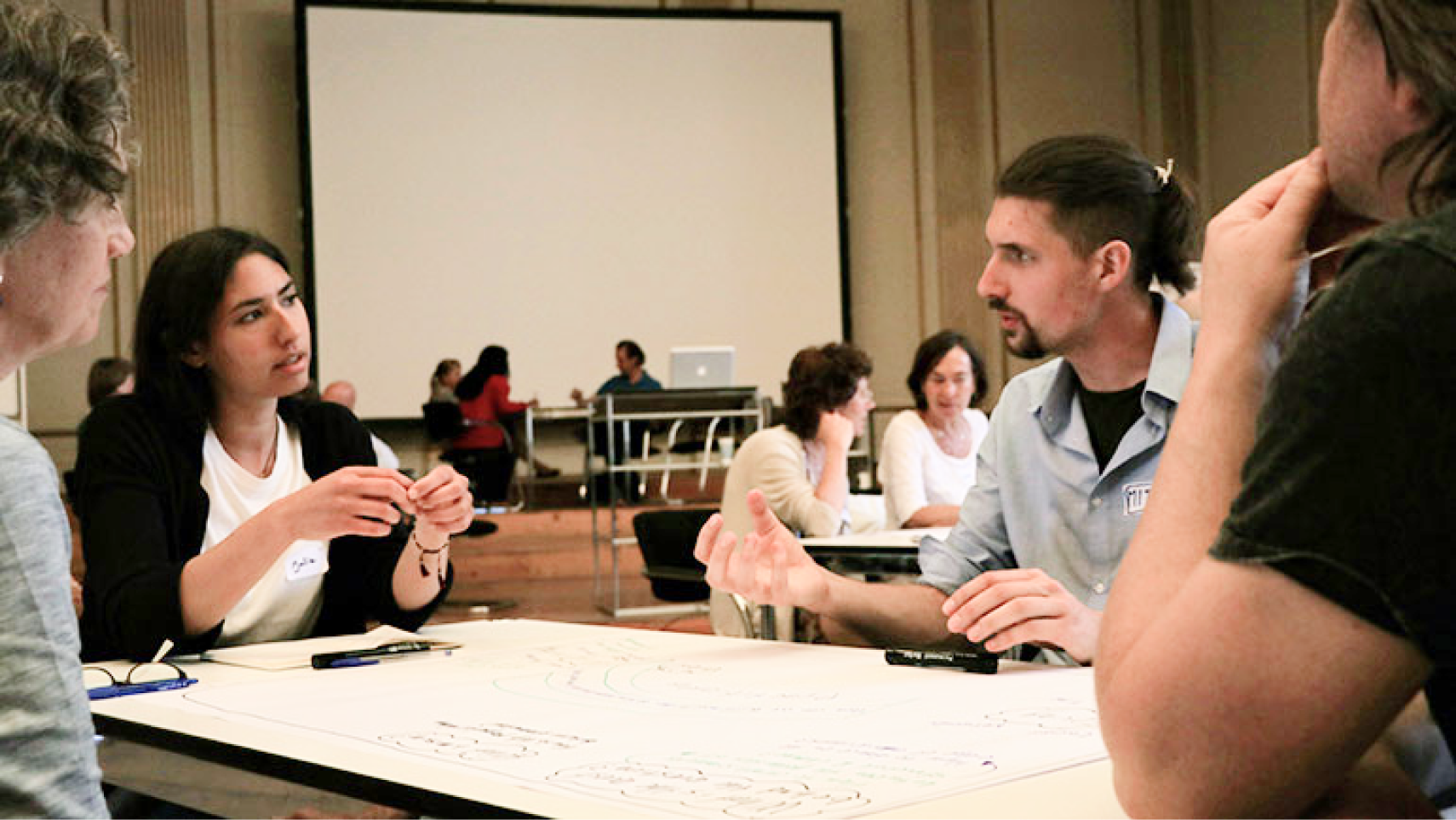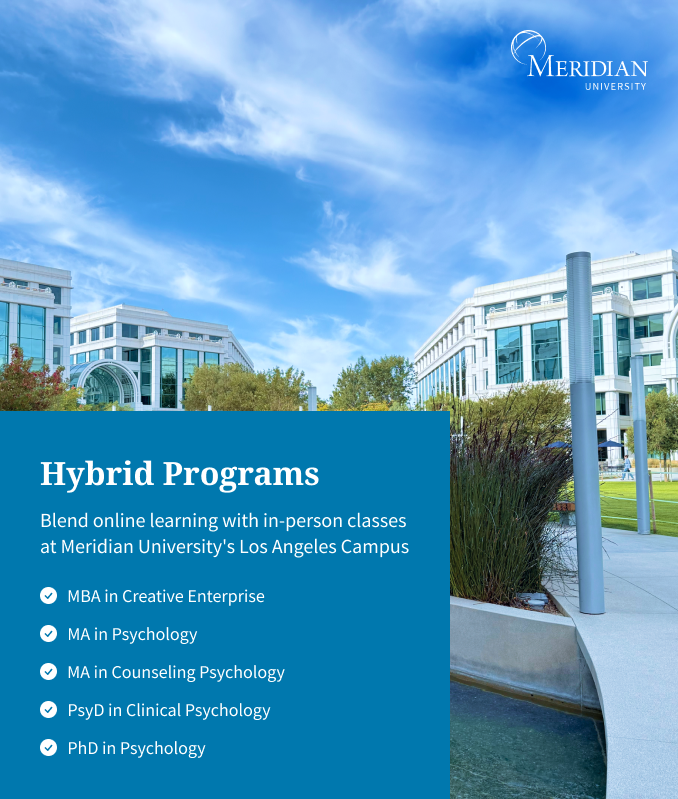

Reimagining Professional Practice
Master's and Doctoral degrees in Psychology at Meridian provide a cumulative, emergent, and integrated curriculum, empowering the student’s transformation both personally and professionally.
The Graduate School of Psychology integrates a number of diverse orientations including Integral Psychology, Somatic and Yoga Psychology, Depth Psychology, Transpersonal Psychology, and Clinical Psychology. Learning outcomes include collaborativity, law and ethics, process skills, psychopathology, reflexivity, empathy, and culture.
Psychology at Meridian integrates three distinct dimensions of Psychology: academic discipline, vocation and profession. Psychology at Meridian seeks to reclaim the soul through the imagination, and draws on numerous knowledge domains which are not a recognized part of the conventional discipline and profession of psychology.
MA in Counseling Psychology
Seeking a masters degree that enables professional clinical practice?
The Master’s in Counseling Psychology curriculum emphasizes clinical courses as well as core courses that support the student’s evolving relationship to professional practice.
- Part-time, full-time, and accelerated options available.
- Designed to prepare students for work as a therapist or clinical counselor.
- Diverse concentrations enable personalized degree paths.
- Flexible learning formats and individualized academic advising.
PsyD in Clinical Psychology
Looking to practice as a clinical psychologist?
The PsyD in Clinical Psychology curriculum offers innovative coursework in Psychology to prepare students for professional practice, including core, clinical, and research courses. The core curriculum provides a foundation for the clinical and research courses, supporting the student’s evolving relationship to clinical engagement.
- Complete in as little as 33 months on the accelerated path, with standard and part-time degree paths also available.
- Alumni often pursue psychologist licensure
- No dissertation required - students complete a Clinical Case Study.
- Work one-to-one with a faculty member who serves as your Clinical Case Study advisor.
PhD in Psychology
Ready to pursue a research-focused doctorate in Psychology?
The PhD in Psychology curriculum offers coursework in Psychology drawing on spiritual traditions, somatic practices, creative arts, mythology, indigenous wisdom, literary and poetic imagination, deep ecology, mystical philosophy, cultural history, and social critique.
The PhD program emphasize research, clinical, and cultural praxis skills as well as acquiring the knowledge base of psychology as a profession. The research coursework prepares students for the completion of an original research dissertation.

Susan Walsh — PhD, Counseling Psychologist



Professional Future
Meridian's Master's and Doctoral degrees in Psychology are designed to prepare graduates for a professional future in the contexts noted below, with which the concentrations are specifically aligned.
- Professional Clinical Counseling
- Marriage and Family Therapy
- Clinical Psychology
- Developmental Coaching
- Depth Consultation
- Health and Wellbeing Coaching
- Organizational Leadership and Development
- Psychotherapy Practice
- Career Counseling
- Yoga Therapy
- Somatic Education and Research
- Organizational Consultation
- Professional Clinical Counseling
- Marriage and Family Therapy
- Clinical Psychology
- Developmental Coaching
- Depth Consultation
- Health and Wellbeing Coaching
- Organizational Leadership and Development
- Psychotherapy Practice
- Career Counseling
- Yoga Therapy
- Somatic Education and Research
- Organizational Consultation
Ready to explore your professional future?
Meridian's Master's and Doctoral degrees in Psychology are designed to prepare graduates for a professional future in the contexts noted below, with which the concentrations are specifically aligned.
Learn More




Prepare for Psychologist, Therapist, and Counselor Licensure
Graduates of Meridian’s PhD in Psychology, PsyD in Clinical Psychology, and MA in Counseling Psychology degree programs often pursue licensure to practice as a psychologist, therapist, or professional counselor. Connect with an Admissions Advisor to explore your specific licensure goals.
Concentrations
The Business Psychology concentration at Meridian is designed for those who seek to redefine the landscape of organizational behavior and leadership through a lens of group facilitation and psychological depth.
The Clinical Psychology concentration emphasizes coursework aligned with the practice of psychotherapy in contexts such as community clinics, private practice, employee assistance programs, and forensic contexts.
The Collective Trauma and Social Healing concentration is intended for Master's and Doctoral students in the Psychology and Education programs who aspire to be social healing practitioners in the context of their professional goals.
The Depth Psychology concentration emphasizes coursework aligned with professional practice in contexts such as psychotherapy, coaching, depth consultation in organizations, career counseling, teaching.
The Organizational Development concentration emphasizes coursework aligned with the practice of organizational leadership and development in various institutional domains, like: Business, Non-profits (NGOs); and government including sectors such as education, law, and the arts.
The Developmental Coaching concentration emphasizes coursework aligned with practice in contexts such as executive coaching, developmental assessment, and management of deliberately developmental organizations.
The Expressive and Movement Arts concentration emphasizes coursework aligned with professional practice in contexts such as conventional healthcare settings, coaching practices, employee wellness programs.
The Health and Wellbeing Coaching concentration emphasizes coursework aligned with professional practice in contexts such as conventional healthcare settings, coaching practices, and employee wellness programs.
The Integral Psychology concentration emphasizes coursework aligned with professional practice in contexts such as psychotherapy, coaching, depth consultation in organizations, career counseling, and teaching.
The Somatic Psychology concentration emphasizes coursework aligned with professional practice in contexts such as somatic education, psychotherapy practice, Health and Wellbeing Coaching, employee wellness programs. The approach to learning somatic psychology at Meridian University is rooted in the transformative learning paradigm at the heart of Meridian’s programs, with a particular emphasis on embodied approaches to teaching and learning.
The Transformative Leadership concentration emphasizes coursework aligned with practice in contexts such as executive coaching, developmental assessment, and management of deliberately developmental organizations.
The Transformative Learning concentration emphasizes coursework aligned with professional practice in contexts such as education, organizational leadership, and adult education.
The Transpersonal Psychology concentration emphasizes coursework aligned with professional practice in contexts such as psychotherapy, coaching, consultation to organizations, career counseling, teaching.
The Yoga and Psychology concentration is intended for master's and doctoral students in the Graduate School of Psychology who wish to have more expertise on the relationship between Yoga and Psychology in the context of their professional goals. The concentration emphasizes coursework aligned with professional practice in contexts such as yoga therapy, yoga teaching, psychotherapy practice, somatic education, and somatic research.

Rich Mccuthchan — PhD, M.F.T, Psychotherapist





Academic Structure
Meridian’s academic structure gives students the flexibility to navigate the University’s curricular architecture in ways that match their passions, professional goals, and other life commitments.
The structure is designed to serve a diverse student body, who live around the globe, have varied cultural and clinical visions for their careers, and are at different stages in their professional journey.
Students enroll in a degree program, can elect a concentration, and register for one or multiple courses each quarter. In addition to core courses for the specific degree program and anchor courses that represent the Transformative Learning intent of Meridian’s curriculum, students select elective courses that align with their Meridian concentration, background, and career path.
Learning Formats

Online Format
The online learning format allows students to complete 100% of their degree requirements remotely from anywhere in the world. Grounded in a distinctive faculty-led model, Meridian’s dynamic online learning platform provides maximum flexibility while maintaining high levels of engagement.

Hybrid Format
Meridian’s hybrid learning format integrates online courses with in-person classes at the Los Angeles Campus. This format combines an innovative online learning approach with face-to-face engagement with faculty, staff, and peers while offering access to co-working spaces and campus resources.
Accreditation and Financial Aid
Meridian University is a degree-granting higher education institution accredited by the Senior Commission of the Western Association of Schools and Colleges (WASC). As an accreditor, WASC is recognized by the U.S. Department of Education. WASC is also an accreditor of the University of California, Berkeley, UCLA, and Stanford University.
Meridian is approved by the U.S. Department of Education for participation in the Federal Student Aid programs as well as by the U.S. Department of Veteran’s Affairs for the training of veterans and other eligible persons.
The University is approved by the U.S. Department of Homeland Security to provide form I-20 to eligible international students, enabling travel to and stay in the United States.
Meridian offers institutional financial aid to qualified international students.
Ready to explore your professional future?
Meridian’s Admissions Team has a single goal: help you find the right path towards personal and career development. Explore articles, videos, guides, and real student experiences, plus chat one-on-one with an Advisor or schedule an opportunity to meet faculty.
Learn More



